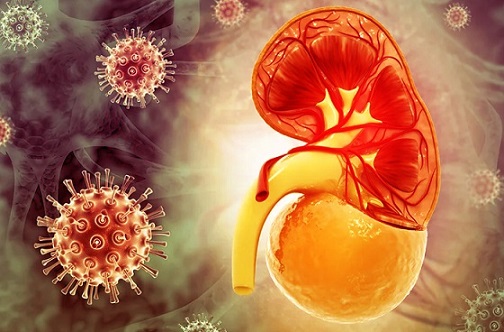COVID-19 Infection Triggers Different Kidney Damage Patterns Depending on Existing Kidney Health
Nikhil Prasad Fact checked by:Thailand Medical News Team Apr 30, 2025 5 hours, 16 minutes ago
Medical News: A new study by Italian researchers has shed critical light on how COVID-19 affects the kidneys, uncovering that the risk of acute kidney injury (AKI) during a SARS-CoV-2 infection hinges significantly on whether a patient already suffers from chronic kidney disease (CKD). The study, conducted by scientists from the University of Palermo and Kore University of Enna, reveals that unique inflammatory biomarkers predict kidney injury risk differently in patients with and without pre-existing CKD.
 COVID-19 Infection Triggers Different Kidney Damage Patterns Depending on Existing Kidney Health
COVID-19 Infection Triggers Different Kidney Damage Patterns Depending on Existing Kidney Health
The research, which analyzed 84 hospitalized COVID-19 patients, aimed to find early warning signs for AKI, a dangerous complication that can worsen the chances of recovery. This
Medical News report reveals that IL-6 and a marker known as the neutrophil-to-lymphocyte ratio (NLR) are strong indicators of AKI in people already living with CKD. On the other hand, in patients without CKD, a simple white blood cell (WBC) count was found to be a more accurate early signal of kidney trouble.
Why the Kidneys Are in Danger During COVID-19
Although COVID-19 is commonly known as a respiratory illness, the virus can wreak havoc far beyond the lungs. One of the most serious complications in hospitalized patients is acute kidney injury, which affects up to one-third of those with severe infections. AKI can lead to long-term dialysis or even death if not detected early.
The virus causes kidney damage through two primary routes: it can directly infect kidney cells using ACE2 receptors (the same molecular doorways it uses to enter the lungs), or it can indirectly harm kidneys by causing widespread inflammation, blood clots, and oxygen deprivation.
Different Biomarkers Tell Different Stories
The study, led by Dr. Caterina Carollo and her colleagues at the University of Palermo’s Unit of Nephrology and Dialysis and its Department of Health Promotion (PROMISE), along with collaborators at the Azienda Ospedaliera Ospedali Riuniti Villa Sofia Cervello and the “Kore” University of Enna, meticulously compared the medical data of 25 patients with CKD and 59 patients without.
Among CKD patients, two markers stood out sharply: IL-6, a powerful pro-inflammatory cytokine, and NLR, which measures immune system imbalance. Elevated IL-6 and high NLR levels were strongly linked to the development of AKI in these patients. Notably, these markers showed high diagnostic accuracy—over 85% in predicting AKI in CKD cases.
In contrast, these same biomarkers did not perform well in predicting AKI in those without chronic kidney disease. Instead, a high white blood cell count—a simple and widely available test—proved to be the most reliable indicator in this group. Elevated WBC levels suggest a rapid immune response, often driven by infections or inflammation, which may be enough to trigger kidney injury in otherwise healthy individuals.
<
;strong>Why This Matters for COVID-19 Care
Understanding which patients are most at risk of kidney failure during COVID-19 can help doctors act faster and more effectively. The researchers propose that routine monitoring of IL-6 and NLR in CKD patients, and WBC in those without kidney issues, could be a low-cost, lifesaving tool in hospitals worldwide.
Their analysis showed that CKD patients not only had a higher chance of developing AKI (32% vs. 11% in non-CKD patients), but they also had a dramatically higher death rate (52% vs. 7%). This underscores the urgent need for targeted monitoring in these vulnerable populations.
Conclusions and Implications for the Future
This study offers a groundbreaking look at how chronic conditions like CKD change the body’s response to COVID-19. In people with pre-existing kidney problems, the risk of acute injury is driven more by ongoing, systemic inflammation, as seen in raised IL-6 and NLR levels. For healthier patients, however, sudden immune responses are the main trigger, making WBC a better predictor. These findings could reshape how hospitals monitor COVID-19 patients, leading to faster interventions and potentially saving lives. Widespread use of these simple biomarkers could help prioritize care and prevent severe outcomes, especially in regions with limited healthcare resources.
The study findings were published in the peer reviewed journal: Life.
https://www.mdpi.com/2075-1729/15/5/720
For the latest
COVID-19 News, keep on logging to Thailand Medical News.
Read Also:
https://www.thailandmedical.news/news/kidney-issues-emerging-in-children-after-mild-covid-19-infections-raises-new-concerns
https://www.thailandmedical.news/news/covid-19-accelerates-kidney-function-decline-in-transplant-patients-even-four-years-after-infection
https://www.thailandmedical.news/news/microrna-192-could-become-a-gamechanger-in-diagnosing-early-stage-diabetic-kidney-damage
https://www.thailandmedical.news/pages/thailand_doctors_listings
https://www.thailandmedical.news/articles/hospital-news
